Giorgia Meloni © fratelli-italia.it
“In these elections there is only one winner, who is Giorgia Meloni,” wrote Luciano Fontana, for the television service of the popular Italian daily newspaper, Corriera dela Sera. There could be no doubt about it anyway, looking at the voting figures. Ms. Fontana dismisses those who would dispute the outcome, too. “The others who declare themselves winners have actually recovered compared to what were the numbers of the polls, but they have fallen compared to the last elections”, wrote Fontana. So, there you have it: the bald statement of how the Italians chose their next Prime Minister. She may not have been the choice of many in the wider Europe, but it’s what the Italian voters want that matters here. And they very clearly chose Giorgia Meloni. It was not an uncontroversial choice; Meloni joined the youth section of the neo-Fascist Italian Social Movement when she was just 19 years old and is on record as having praised Benito Mussolini, not the most popular figure in the popular imagination of many in the West, on several occasions. Life for her has not been easy. She claims that her father, Francesco Meloni, walked out on her mother, her sister and her when she was just one year old. He was later arrested by Spanish police when they found 50 bales of marijuana on board a yacht he had just sailed to Majorca from Morocco. He was given a 9-year prison sentence. It’s hardly a great start in life for an ambitious daughter and would-be politician. Her fondness for Mussolini can’t have helped her much, either, although he is not so reviled in the history of his home country as his memory is elsewhere.
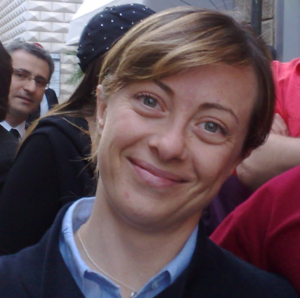
Unlike Mussolini, Meloni has never published Socialist newspapers, although it would seem that Mussolini’s commitment to Socialism was, at best, never more than skin-deep. Both were journalists, however. Il Duce, as he was known, wanted to ally Italy with Western democracies, but his invasion of Ethiopia had put paid to that. To cap it all, he then chose to back Germany’s new Nazi leader, Adolf Hitler, in supporting Francisco Franco’s Nationalists in the Spanish Civil War. It’s strange that he was modelling himself on Hitler, when Hitler had modelled himself on Mussolini. However, it very soon became clear which was the more powerful, and by a considerable margin.
Like Meloni, of course, Mussolini was an arch-nationalist, as well as being a journalist. Through his newspapers, he was an avid supporter of a hard line on nationalism, something that became apparent with the start of the First World War. In the war he had been a highly-regarded sniper, using real bullets instead of a killing turn of phrase. As far as one can tell, Meloni is not famed for her accuracy with a firearm, but her writing is somewhat barbed. Nor does it seem likely that she will begin to find it prudent to assemble large groups of paramilitary supporters. In Mussolini’s case, they became known as the Blackshirts, who travelled around committing arson, especially setting fire to government buildings. Their hero, of course, was the man who called himself Il Duce, which means “the boss” or “the chief”.
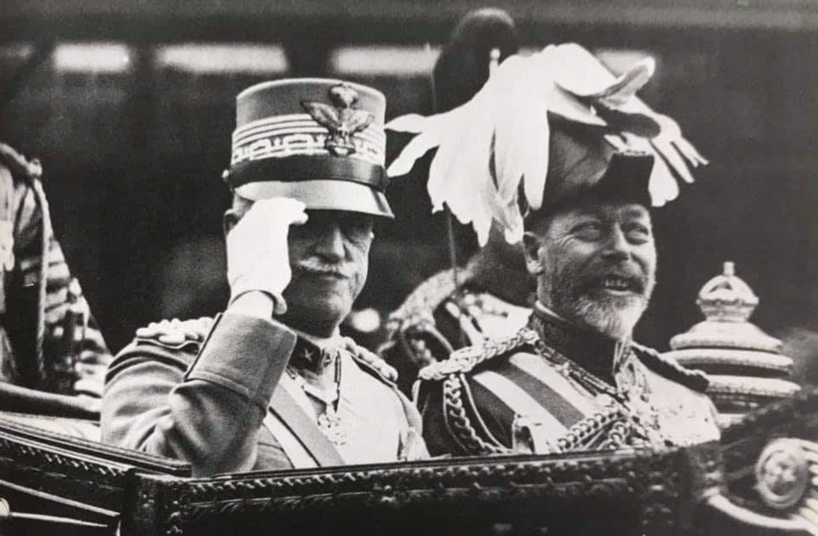
It was an odd title to choose, perhaps, but at least it made his intentions crystal clear. In a foretaste of what Donald Trump’s supporters attempted on 6 January 2021, in Washington, some 30,000 of Mussolini’s “troops” swarmed into the capital in Rome and demanded a revolution. Resistance seemed futile, so King Victor Emmanuel III appointed Mussolini as Prime Minister. Some historians believe that the decision marked the real start of World War II, but in any case, happening – as it did – in late September 1922, Meloni is now able take advantage of the event’s centennial; a useful coincidence for her. But Meloni is not Mussolini and hasn’t called for a revolution or a war, although she has made it clear that she wants to see some fairly considerable changes.
LEANING TO THE RIGHT, THEN FURTHER RIGHT
Meloni’s far-right “Fratelli d’Italia” party are not like Mussolini’s Fascists but he may well have approved of her, believing, as she does, that Italy need take no lessons from its European neighbours. Indeed, Meloni is highly suspicious of the EU’s bureaucrats and is much more Eurosceptic than the technocratic prime minister she replaces, the pro-European Mario Draghi. Experts are predicting that Meloni will align her country more closely with the troublesome Hungarians and Poles, especially the Poles. But in order to govern, her Brothers of Italy party still needs allies, which will have to include the populist Northern League of Matteo Salvini and Silvio Berlusconi’s Forza Italia (Go Italy).
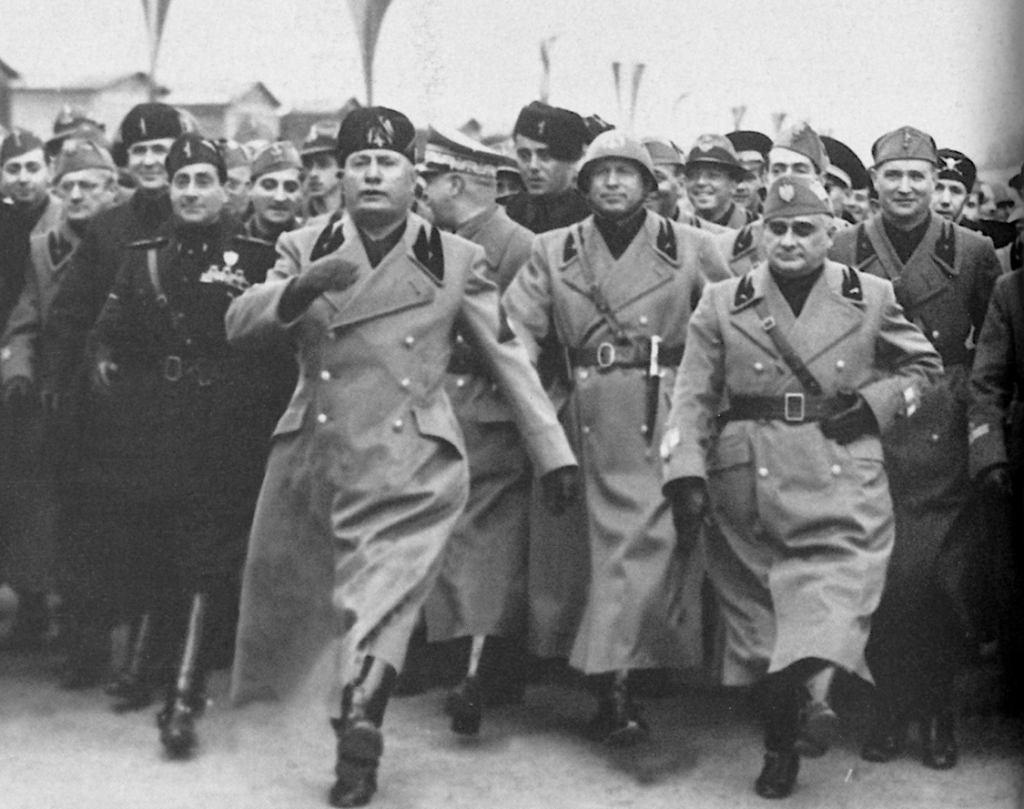
But even putting all three parties together, they only account for just over 43% of the overall vote; hardly a resounding victory. It’s enough, though. Even so, Meloni’s government will be breaking new ground; she will be Italy’s first-ever female Prime Minister, which has allegedly drawn cautious praise from Hilary Clinton, who said in an interview published in Corriera dela Sera when Meloni was leading the poll but not yet elected: “The election of the first prime minister in a country always represents a break with the past, and it is certainly a good thing.” But then, as with any leader, woman or man, she must be judged by what she does. I seldom agreed with Margaret Thatcher, but I admired her determination. Clearly then the ideas are voted on.” Whether Clinton still sounds so enthusiastic once Meloni starts to exercise power over her country’s government we shall see in time. Will she be more like Thatcher or Mussolini? The jury is still out.
So just what can we (and Mrs. Clinton) expect? Well, Meloni is considerably more Eurosceptic than Draghi, and this will show in her policies. She seems especially hostile towards the French view of Europe’s future. Draghi had won plaudits for the EU’s response to COVID and to its economic consequences, as well as to the euro crisis and to Russia’s unprovoked war in Ukraine and the effect it has had on energy supplies and prices.
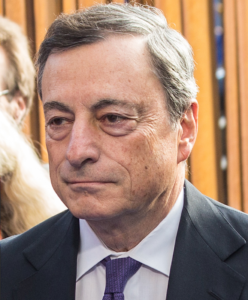
Draghi, in other words, was a class act, while Meloni is, to a large extent, an unknown quantity. Doing the right thing, though, doesn’t always make a politician popular and Draghi’s closest political allies, the Democratic Party led by Enrico Letta, won only 26.2% of the votes. Italy had been a driving force behind the development of the European Union – formerly the European Economic Community and even earlier the European Coal and Steel Community – since it was first suggested by French foreign minister of the time, Robert Schuman, on 9 May, 1950. Back then, Enzo Giacchero, Italy’s member of the High Authority of the European Coal and Steel Community (fore-runner of the EU), was an enthusiastic supporter of closer political union. Were he still alive (he’d be 110 years old if he was) he would probably disapprove of Meloni’s stated aims. But the world has changed a lot since those heady early days.
As for Meloni, she comes from a poor working-class area of Rome, so her views are not surprising. She has been accused by some (many of whom chose not to vote at all) as a complete fascist and as a homophobe. Marialuisa Vola, a young Roman artist who didn’t vote, described her to Microsoft’s MSN news website, as a monster. “Stiamo nella merda,” she said; “We’re in deep sh*t”. Political historians will not be surprised. Meloni’s Brothers of Italy party was founded by former Fascist loyalists who had followed Mussolini. Meloni was known for not liking the media, which she saw as left-wing and biased, an accusation sometimes echoed by America’s Donald Trump. After all, the Brothers only gained some 26% of the vote and Meloni’s victory is largely down to Italy’s bizarre voting system. The two parties that are now joining the Brothers in a coalition failed even to get 10% of the votes each.
As for policies, Meloni is counting on a degree of native conservatism (with a small “c”) as the population turn against what have been described as “woke” politics, while her possible left-wing rivals failed to overcome their differences on key points of policy. The plain fact is that in an election that saw a very low turn-out, most people did NOT vote for Meloni, even if they didn’t vote for anyone else either. A great many Italians simply chose to abstain from participating at all.
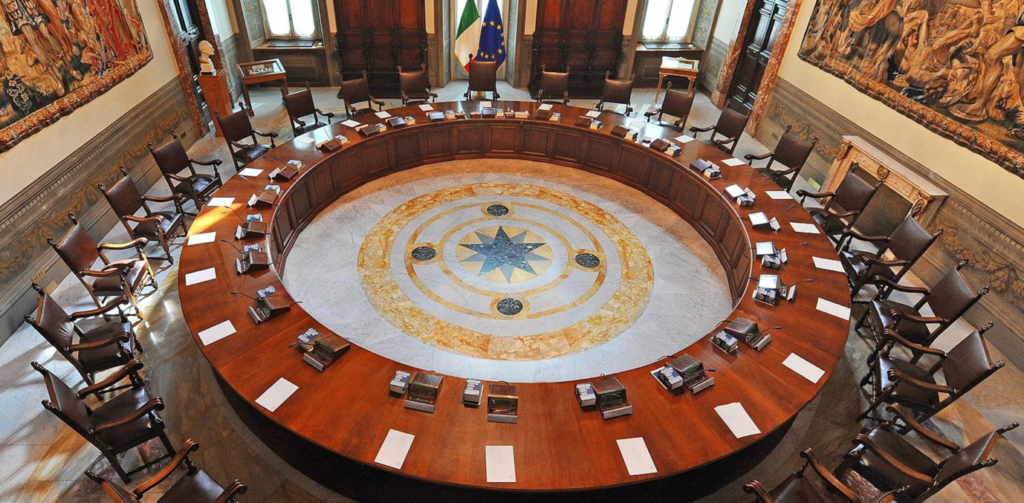
Meloni, however, did present the electorate with policies, even if they were not policies that were ever likely to appeal to everyone. One of the central tenets of her policies concerned asylum seekers, who she clearly doesn’t like much. She made plain that she was not keen on the sorts of policies sometimes classed as “woke”. She pledged to come down hard on inflation, including by abolishing the popular (among the poor) “citizens’ income” that helped the most desperate to avoid starvation, but which cost business owners money to fund. She talked tough about immigrants and LGBTQ rights, neither of which meet with her approval. In fact, her political aims and ambitions can be more clearly explained in terms of what she doesn’t like and would like to stop. It has been pointed out, however, that Meloni’s Brothers of Italy manifesto makes barely any reference to women’s rights or gender issues. Could it be, as some have suggested, a position she has adopted purely to win votes and in which she doesn’t really believe? Probably not, although Meloni does seem to have softened her stance on some issues since winning the election.
That may weaken the opposition to her which was stoked up by some of the election’s sillier moments, such as the call by Meloni’s party to ban an episode of the children’s TV cartoon show, Peppa Pig. It sounds funny but it isn’t, in fact, at least not to the Brothers of Italy party’s supporters and others who see gender rights in the broader sense: the episode in question features two female polar bears raising a child (cub?) and clearly cohabiting and fulfilling the ‘mother-and-father’ rôles respectively. Unimportant? To those who’ve never experienced such a situation it may seem trivial, almost a joke, perhaps, but normalising such sexual relationships in the eyes of children may be seen by some as ‘potentially dangerous’.
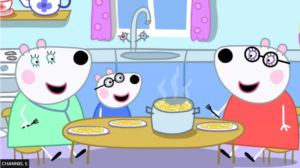
The episode in question has been broadcast in the UK without it causing any problems, it seems, and no gay couples have run cheering into the street, but Meloni’s supporters would no doubt point to the ‘drip, drip, drip’ effect of seeing such relationships as normal over extended periods of time, even in children’s television programmes. An attack on Peppa Pig, though, probably does little to reinforce Meloni’s “street cred” among the wider public, especially among those predisposed to dislike the far right anyway. No-one seems to have commented on another perhaps equally controversial aspect of this particular episode. In answer to a question about how the family operates in this single-gender household, the cartoon “child” in question, explaining it to a visitor, says: “I live with my mummy and my other mummy. One mummy is a doctor and one mummy cooks spaghetti.” To me, this suggests sexual stereotyping: the “male partner” (the “husband” part of the partnership, even if female?) goes out to work while the “female partner” (can we call her the “wife partner”?) is stuck at home with only boring old housework to do. Perhaps political persuasion (indoctrination?) in childhood should be avoided altogether, regardless of the supposed “message”, whether well-intentioned or otherwise. And, of course, there’s much more to Italian cuisine than spaghetti. Even I can cook that.
THE CURRENT MENU
Meloni has relentlessly focussed her political intentions on “God, country (or ‘fatherland’ in some versions) and family”, formerly a slogan of the Fascist movement. That includes rolling back some of the country’s rules aimed at protecting people from COVID, which are among the strictest in Europe. The health rules, introduced by outgoing prime minister Mario Draghi, include compulsory vaccinations for people wanting to use public transport, go to work or patronise shops and restaurants. The obligation for health care workers to be vaccinated will not be renewed when in expires in December, other than to protect the elderly or infirm. The recommendation to get vaccinated will remain in place, however, although she has chosen not to get her daughter vaccinated against SARS-Cov-2, arguing that a person under the age of 19 is no more likely to die of COVID than to be struck by lightning. According to the scientific press, that seems to be wrong. The virus has not been eradicated and there has been an increase in case numbers in the United States, where there have now been more than a million virus-related deaths. Wishing it had gone won’t make it do so.
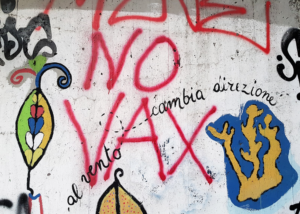
Meloni’s views on abortion are controversial, too. She has said she doesn’t want to ban it but that women who want one should be offered “an alternative”, with organisations opposed to abortion in principle having access to pregnant women with an office provided where they can attempt to dissuade the woman concerned from going ahead with the procedure. Those supportive of a woman’s right to an abortion fear there will be strong psychological pressure to avoid one, because Meloni is against them. On less controversial ground, Meloni’s party has been promoting a plan to sell off Telecom Italia SpA, using the money thus raised to reduce its debts. She is also opposed to euthanasia, same-sex partnerships (even among cartoon pigs, it seems) and to opening Europe to non-European migrants. She doesn’t much like multiculturalism, either. She supports NATO but isn’t terribly fond of the European Union and prior to Putin’s invasion of Ukraine (which she roundly condemned) she favoured closer relations with Russia. Her right-wing views go back a long way; at the age of just 19 she expressed her admiration for Mussolini and other Nazi collaborators. She admits to being a populist and a nationalist but has denied being a Nazi.
Her father was a tax advisor, as well as being a drug smuggler, who walked out on his young family when she was just 1 year old, to sail off to start a new life in the Canary Islands. However, he was caught and arrested at the port of Mahon on the island of Menorca. Tax advisor or not, according to the Diario de Mallorca newspaper he was carrying rather more than tax forms from Morocco. As for his young daughter, she seems to have been attracted to far-right politics from a young age. She defended Silvio Berlusconi’s right to pass laws that benefited his companies, and this partially led to her being appointed Minister of Youth in 2008, a position she retained until Berlusconi was forced to resign.
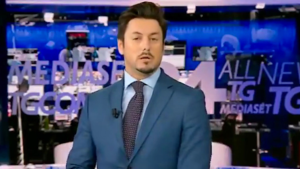
Together with two others, she was instrumental in creating a new political party, Brothers of Italy. In 2016 she took part in demonstrations against the right of LGBT people to adopt babies and young children and later that year she gave birth to a daughter, Ginevra, fathered by her partner, Andrea Giambruno, who works for Berlusconi’s Mediaset TV channel. She gave her support to Vox, the right-wing ultranationalist Spanish party and also signed the Madrid Charter, which accused all left-wing groups of being part of a criminal neo-Communist project linked to Fidel Castro. I should imagine Castro wishes he had such devoted, wide-spread support. At Vox’s party congress she said: “Yes to the natural family. No to the LGBT lobby. Yes to sexual identity. No to gender ideology,” as well as “no to Islamist violence, yes to secure borders”, and hitting out at mass migration, big international finance, and saying “no to the bureaucrats of Brussels!” She spoke at the annual Conservative Political Action Conference in Florida where she urged attendees to defend their views against what she called “progressives”.
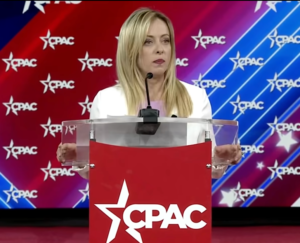
When it became clear from exit polls that she was set to win the 2022 general election, Meloni received the congratulations of the European Commission’s least-loved European leader, Hungarian Prime Minister Victor Orbán, and also from Britain’s Liz Truss (once a pro-EU Liberal, now the UK’s anti-EU and very right wing Prime Minister) and France’s Marine Le Pen, of Front National fame. A popular lady among Europe’s more right-wing leaders is Meloni, it seems. The Republican Party in the United States has also praised her. Meloni has said she won’t change Italy’s abortion laws, despite her personal opposition to the practice, although she will allow doctors to refuse to perform the operation. She has also spoken out against same-sex parenting (by adoption) and has denied that homophobia exists in Italy, making any laws against it pointless. She said that it was not “Italian reality” to claim that there is discrimination against gay people. Her response to claims of anti-gay discrimination is to say it doesn’t exist, although same sex couples hoping to adopt have to travel abroad to be recognised as potential parents.
STANDING OUT FROM THE CROWD
She has expressed support for moves to make it illegal for same sex couples to adopt children. Peppa Pig must be wary. Meloni stands accused of xenophobia and of Islamophobia and seems to support the conspiracy theory beloved of white nationalists that there is a plan to replace white Italians with incomers from elsewhere. What, all of them? It was a popular idea, and not only in Italy. As for beliefs, Meloni says she is what she appears. She told a rally held in Rome that: “I am Giorgia, I’m a woman, I’m Italian, I’m Christian”. Some in the higher levels of the Catholic church may dispute that; on the same day as people were voting, Pope Francis was urging his fellow-Italians to help migrants. As the Catholic Herald reported: “This is a pontiff, after all, who has called on Catholics to take in refugees in the past, asking ‘why not make a policy of the West where immigrants are included with the principle that the migrant should be welcomed, accompanied, promoted, and integrated?’
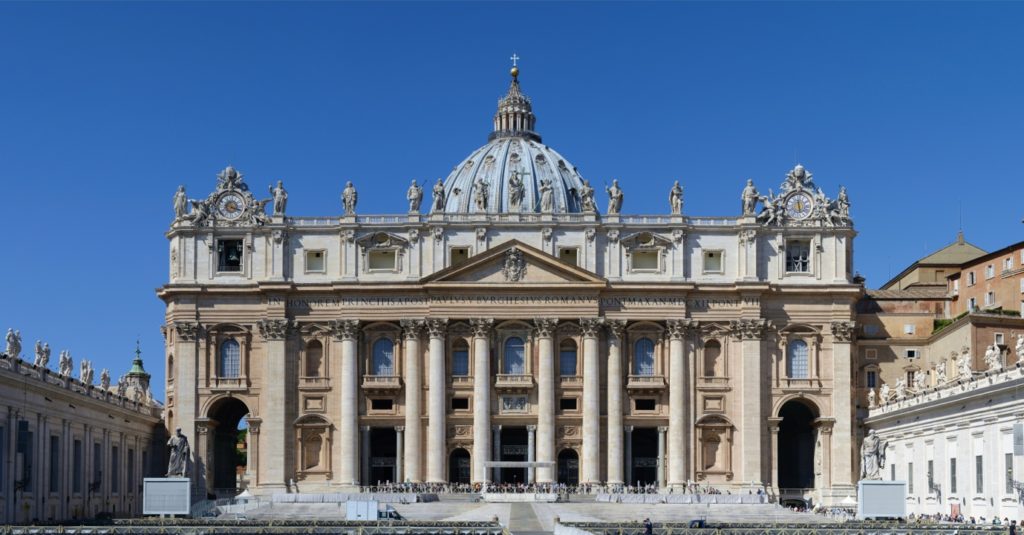
He said on his return from Kazakhstan, ‘migration I think at this time should be taken seriously, because it raises the intellectual and congenial value of the West a little bit’.” Speaking one Sunday, the Pope said: “Migrants are to be welcomed, accompanied, promoted and integrated.” This clearly does not resonate with many Italians, with their country at the forefront of migrant crossings from Africa. It would seem likely that a conversation between the Pope and Meloni would not be characterised by a discussion on points of belief. The Catholic Herald reported that: “Strikingly, Meloni has said she has failed at times to understand Pope Francis. In her autobiography, while Meloni called St. John Paul II ‘the greatest pope of the modern era,’ and even ‘a saint,’ she said of the incumbent, ‘even though I’m Catholic and I’ve never allowed myself to criticise a pope, I admit that I haven’t always understood Pope Francis.’ Back in 2020, she was quoted as saying: “I’m a believer and I listen to the words of His Holiness, but on a political level I don’t always share them.”
The Religion Unplugged website pointed out that Meloni had run under her slogan “God, Homeland (or Fatherland) and family”, a slogan she shared with the pre-war Fascists. She ended her speech by quoting St. Francis of Assisi: “Start by doing what’s necessary, then do what’s possible, and suddenly you are doing the impossible.” She would like to curb Muslim extremism, too, and wants Italy to raise the issue of human rights with Saudi Arabia. She has been described in the Mirror Online as Italy’s “most extreme leader since Benito Mussolini.” It’s worth remembering, though, that: “In Italian politics, governments are formed via alliances. So, while Meloni’s Brothers of Italy party got nowhere near a majority of votes, help from other parties with shared ambitions could see her lead a government.” Not only “could” but “will”, despite the in-built conservatism (with a small “c”) of the Italian electorate. Meloni has praised Mussolini on several occasions, such as during an interview for a French news channel. “Everything he did, he did for Italy,” she said, “and there have been no politicians like him for 50 years.” There may be a good reason for that. Yes, he did what he did for Italy, but he seems to have (according to some) ignored other nations and nationalities.
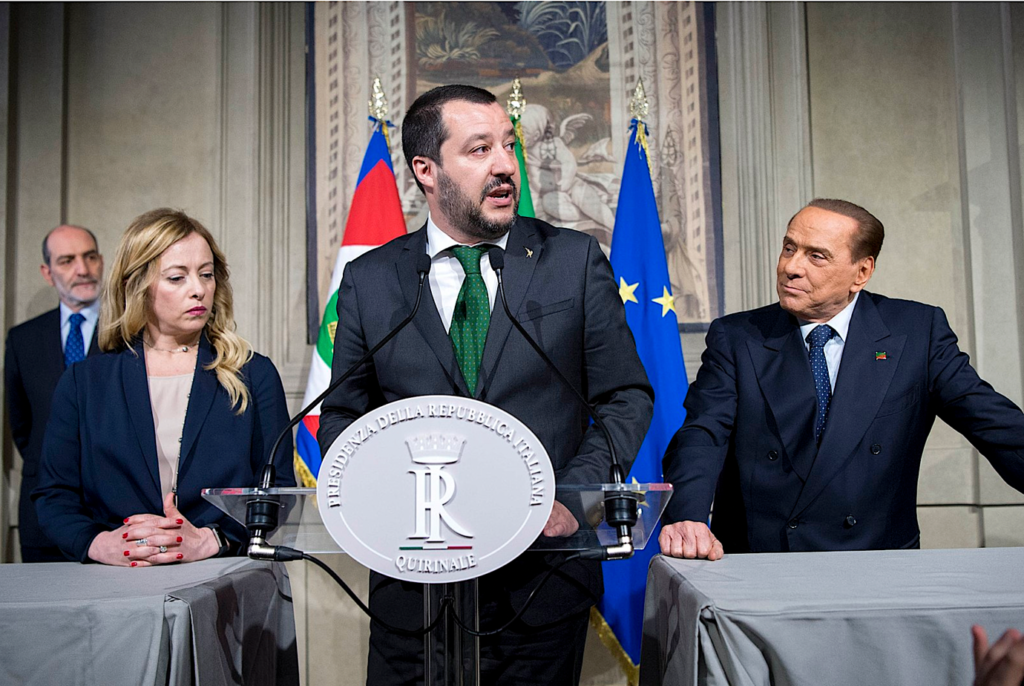
FOR HOW LONG?
British right-wing political commentator Piers Morgan is not surprised by the nature of political change. “The more insanely woke the left becomes, the more European voters are gravitating to right-wing parties,” he Tweeted. “Until the left gets a grip of the lunatics steering its agenda into the PC (politically correct) abyss, this will keep happening.” What about the lunatics steering the right’s agenda into what could turn out to be a reactionary abyss? Meloni does not have the government of Italy to herself, of course. The Brothers of Italy is just the largest of the three right-wing parties now sharing the top position, and getting to the top and staying there will be a struggle. Giorgia Meloni of the Brothers of Italy (FdI), Matteo Salvini of the Northern League (Liga Nord) and former premier Silvio Berlusconi of Forza Italia (Forward Italy!), now aged 85, appeared before thousands of supporters in Rome. Berlusconi warned Meloni not to take too strong a Eurosceptic view when in power. It remains to be seen if she was listening. Political group leaders in Italy are not known for retaining their influence once they’re no longer in power.
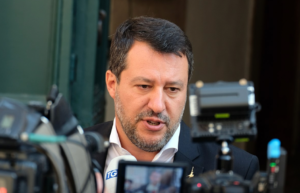
Former MEP and human rights campaigner Alan Donnelly is concerned, not only about Meloni but about the growing influence of intolerance and hate in politics. “There is a troubling trend where right wing populist parties are taking power in European countries. They are rolling back equality laws – which is of course a direct challenge to the fundamental foundations of the EU,” said Donnelly, who is openly gay himself. He doesn’t share Meloni’s optimism that there is no violence against gay people: “I’m convinced we will see a rise in physical attacks on LGBT citizens and a systematic dismantling of national equality laws. The EU institutions must be robust in their response.” Meloni would seem to embody the very attitudes Donnelly fears. Whilst denying being homophobic, she has said: “the state must try to reserve adoption for a man and a woman” and also “take care of the weakest”. Having said that, it’s understandable that parents may show reluctance to place a child with adoptive carers who are in a gay relationship.
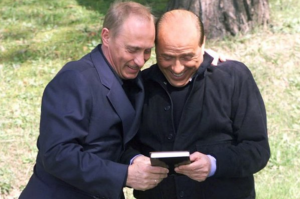
Real parents presumably want the child to be raised in what most people would recognise as a “normal” household, although few would probably go as far as Meloni, who has claimed that the real goal of “gender ideology” is the disappearance of women and “an end to motherhood”, which sounds like a biological impossibility. The Brothers of Italy, along with their political allies, Silvio Berlusconi’s Forza Italia and the populist and federalist Lega Nord, led by Matteo Salvini may squabble over who’s in charge, and whether or not the apparent winners can hold their positions for long is anybody’s guess. Italy is famous for its short-lived and fragmented governments and an on-line question posed to citizens: “how many governments has Italy had since World War 2?” produced several answers, the most popular being “too many”. With so many short-lived coalitions, it’s hard to count. Very few have lasted longer than (or even as long as) 400 days. Only time will tell if Meloni does any better. She is said to be a huge fan of J.R.R. Tolkein’s “Lord of the Rings” books. I wonder if she identifies with the heroic elf princess Galadriel or with the dark lord Sauron, ruler of Mordor? And where is Bilbo Baggins when you need him?

